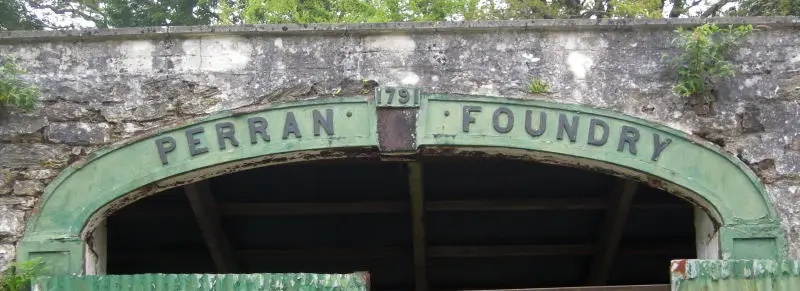
source: wikipedia
It was the home of the Perran Iron Foundry, an innovative concern, run by the Fox family of Falmouth and other Quaker business families. It was set up on the site of a tin smelting works in 1791. The foundry was later operated in partnership with the Williams family, and in 1858, it was sold to them.
The creek serving the factory silted up and mining in Cornwall declined. The wharf had been used to import timber for the mining industry from Scandinavia. The slump in the mining industry during the 1870s hit Perran Foundry badly and it closed in March 1879 with the loss of 400 jobs, causing great distress in the parish. In April 1879, the ‘Royal Cornwall Gazette’ reported that a soup kitchen had been open since January: ‘793 people had attended and 1,240 quarts of soup were distributed’.
The buildings including Manor Mill on the opposite side of the road were later adapted by the Edwards Brothers for the milling and storage of grains and animal foods, and also cloth dyeing; another waterwheel was added. Over the years there have been ambitious plans which have come and gone, but little changed at the foundry site for many years apart from the gradual deterioration of the buildings.
The site has been used for various purposes since but closed in 1986.
In 2005, the owners, North Hill Estates Ltd., applied for planning permission to redevelop the site. The proposal was for a mix of live/work units and residential accommodation. Further consultation on their proposal was ongoing (2007).
Planning was approved and the site has been under development in recent years to enable new homes to flourish from the foundations of its 200-year history. One of the site’s most iconic buildings is The Hammer Mill where all of the workings took place. This will be the first opportunity for people to acquire a home in this historic setting, as the show home opens for private viewings on 24 June 2013 with Heather & Lay and Savills.
source: Grace’s Guide
Cast iron lintel still in-situ at the derelict foundry (2009)
Perran Foundry, of Perranarworthal, an innovative concern run by the Fox family of Falmouth and other Quaker business families. Samuel Tregelles (1766–1831), merchant and rope maker, was one of the twelve partners from its establishment in 1791.
1791 The foundry was set up on the site of a tin smelting works by Robert Were Fox and John Williams of Scorrier to supply machinery to the Gwennap copper mines. Other shareholders were the Price and Tregelles families of Falmouth and Penryn.
1793 Acquired the Neath Abbey Iron Works.
Perran concentrated on the production of smaller components, larger items being constructed at the Neath Abbey ironworks.
Although Fox was anticipating the expiry in 1800 of Boulton and Watt’s patent rights on the manufacture of steam engines, it was not until the 1830s that large Cornish engines were being built at the Perran foundry.
1825 Charles Fox became General Manager of the Perran Iron Foundry at Perranarworthal, taking over from George Fox the second; Charles was also a partner in the family shipping brokerage G. C. Fox at Falmouth.
1842 Charles Fox’s nephew, Barclay Fox, became General Manager.
The foundry was later operated in partnership with the Williams Family, and in 1858, it was sold to them.
The creek serving the factory silted up and mining in Cornwall declined. The wharf had been used to import timber for the mining industry from Scandinavia.
1851 Made cylinders for a massive blowing engine for Dowlais Ironworks
1857 Made cylinders for powerful rolling mill engines for Dowlais Ironworks
1865 Supplied the largest beam blowing engine ever built in Britain for Ebbw Vale Steel and Iron Co (see Ebbw Vale Steelworks). This had a a 72″ bore steam cylinder and a 144″ bore air cylinder. Designed by Loam and Son.
1870s The slump in the mining industry during the 1870s hit Perran Foundry badly
1878 Supplied a beam pumping engine to Hodbarrow Iron Mines in Cumberland
1879 The foundry closed in March with the loss of 400 jobs, causing great distress in the parish.
Note
There are extensive remains of the foundry buildings, although the site is sealed off for safety reasons. The buildings are in very poor condition, although some work has been done to support dangerous walls.